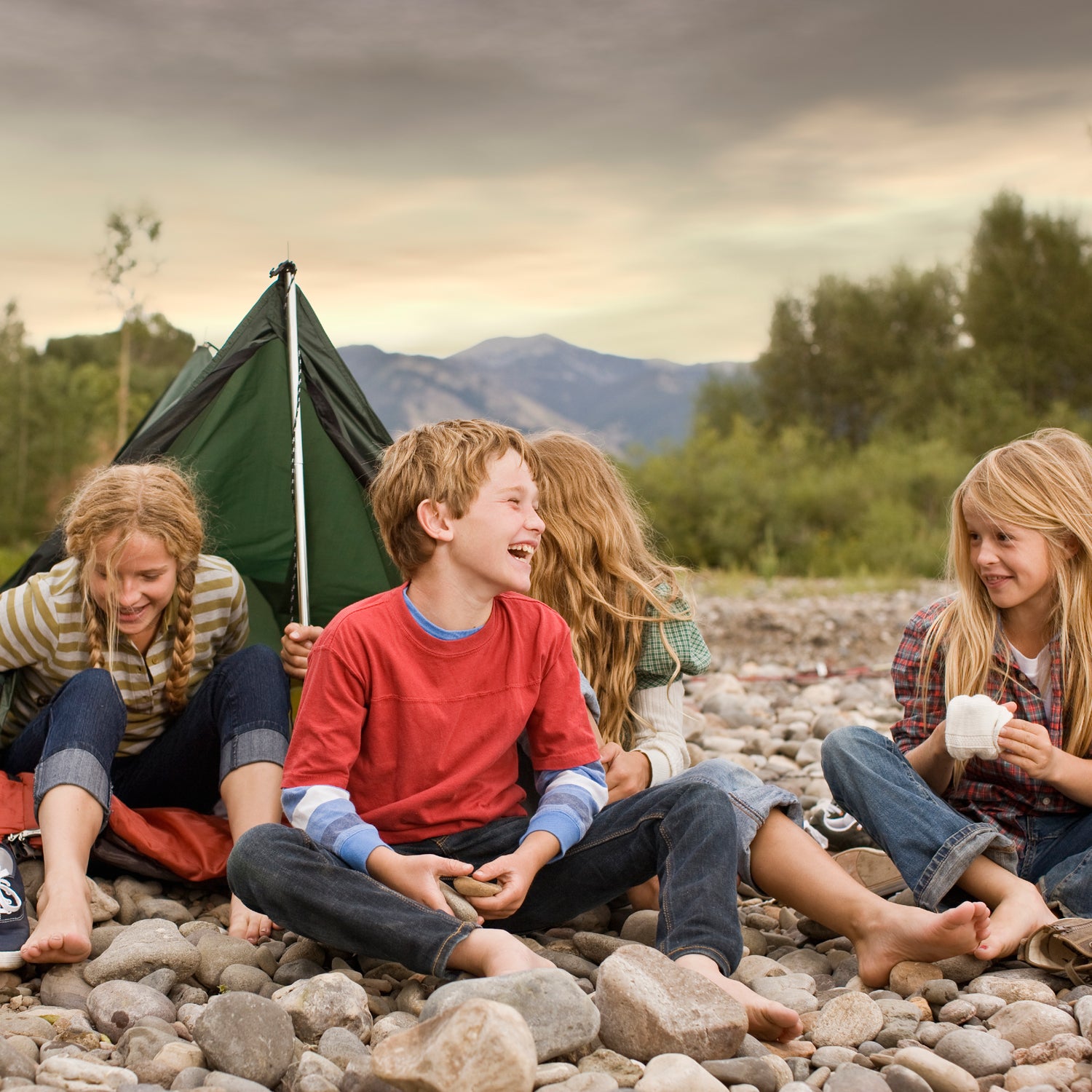A few months ago, I took my six-year-old��daughter to visit my stepmother, Lesley, on her farm in Virginia.��Since my dad passed away four years ago, I’ve been amazed to watch Lesley’s world expand outward, rather than constricting inward, as so often happens after loss later in life. Three of her best friends live��within��walking distance, and they get together every week for dinner. She grows her own��vegetables in her garden out back. She took up running after a decade-long hiatus and came in first of her 70+ age group in a local 10K road race. She generously opens her home to friends. She’s never seemed happier.
When I asked Lesley what her secret is, she answered, with a laugh, “We [she and her friends]��like to think we’re living in our own micro blue zone.”��She’s��talking about the five longevity hotspots around the world��with higher concentrations of centenarians, where people have been proven to live longer. These are places like��the Greek island of Ikaria, Sardinia, Italy, and Okinawa, Japan.
, author of the bestselling books, The Blue Zones and The Blue Zones Solution, and founder of the��research firm��, has spent the past decade studying these cultures. During that time, he has��identified more than a dozen factors—from diet to community to daily commutes—that contribute directly to longevity and happiness. By creating strong neighborly bonds, gathering frequently, staying active, and eating locally, Lesley and her friends have (inadvertently) replicated many of the essential elements of a blue zone.
My daughter Pippa took to life on Lesley’s farm immediately. She collected eggs, fed the horses, picked rhubarb, and roped various older adult acquaintances she’d only just met into playing board games with her at the kitchen table. Pippa’s always been an adaptable, if energetic and occasionally quasi-feral little girl, but as I watched her settle so contentedly into life on the farm, it dawned on me that blue zones aren’t just for adults looking to optimize their golden years.
They can be places where we learn��how to raise happy, healthy children that will grow into thriving, long-lived adults, too.
Not surprisingly, many of the indicators of longevity discussed it Buettener’s books��are the same attributes you’d find in the country’s top adventure dream towns: safety, walkability, access to nature, clean air, and neighborliness. But you don’t have to relocate to Crested Butte or Costa Rica’s Nicoya Peninsula to boost your family’s physical and emotional health and instill healthy habits in your kids that will last a lifetime.��By shifting your lives in subtle, meaningful ways right where you are, you can create your own without leaving home.��I talked to Buettner to understand how:
1. Embrace Your Elders
Each summer my daughters and I travel from our home in Santa Fe to spend a month with my mother and stepfather��at their island cottage in Ontario. With three generations living under one roof, we occasionally get on each other’s nerves, but for the most part, it’s a happy (if sometimes deafening—sorry, Mom) mash-up that benefits everyone. And not just because of the free babysitting.
“Blue zone cultures celebrate age, but here in the U.S., we prize youth,” says Buettner.��But maybe we should rethink the role of grandparents.��“Kids who live with a grandparent have lower rates of disease and they get better care. We call this the Grandma Effect.” Plus, spending time with elders helps kids learn their family histories, which apparently��has health perks for all ages. According to a by researchers at the University of Massachusetts, listening to personal narratives reduces blood pressure and hypertension.
If you don’t have any relatives close at hand, help your kids foster multigenerational relationships with neighbors or friends. Regular, meaningful interactions—playing cards with a neighbor, checking in on a senior who lives alone, or paddling around the island, as we do, and shouting hello to our spry, 90-year-old friend Doreen who lives alone in a cottage on the point—can go a long way toward showing children that “older people are to be treasured, not sent off to Florida,” Buettner says. And they’re pretty great at teaching young children��how to tie their shoes, too.
2. Take a��Walk
For residents of blue zones, “every trip to school or to the store or post office is an occasion to walk,” explains Buettner. “The best thing you can do for your children’s health is to set up their lives so that they’re walking, to school or the park.” It’s good, simple exercise and, as we’ve found with our daughters, being out in the ‘hood at the same time every day is a great way to get to know our neighbors and build a stronger sense of community.
Make sure your kids know the route to the school and park; if they’re too far away, teach them how to walk to the bus stop and take the bus. “If you think that it’s more dangerous for kids to walk to school than be driven, you need to check your facts,” Buettner says. “Kids are much more likely to be in a car accident than be hit by a car while walking, and they’re at far higher risk of dying of than getting snatched by a stranger.”
3. Wean Off of the Screen
“One of the biggest predictors of unhappiness and unhealthiness is screen time,” says Buettner, who notes that in blue zones, “the technological phenomenon of America hasn’t crashed through yet.” (Operative word: yet.) His recommendation: No more than one screen per house (nope, not per person).
If that sounds too radical, try asking kids, spouses, relatives, and friends to surrender their devices at the door, and allow them only at pre-approved times. This does not mean a complete ban on TV. According to a joint Blue Zones/University of Illinois study, people who watch no television are actually less happy than those who watch about 45 minutes per day. “After an hour,” Buettner explains, “there’s a clear downward slope.”
4. Eat as a Family
Sit down together for at least one meal every day. “This is a sacred ritual that’s indisputably in place in every blue zone,” Buettner says. “When you gather for a meal, you tend to eat more slowly. If you’re eating in a hurry or under stress, your digestion is impeded by cortisol. Taking your time creates a situation where your nutrition is more likely to be used as energy, not converted to fat.”
Stock up on ample supplies of nuts, your child’s favorite fruits, sweet potatoes, and beans—dietary staples in the blue zones—and avoid bringing sugary beverages, packaged sweets, salty chips or processed meats into the house. All are conclusively linked to higher rates of disease and obesity. Without these temptations close out hand, Buettner says, “kids will eat 40 percent healthier simply by default.” Finally, sharing healthy food is also an act of communing and communicating. “You’re rehashing the day,” he says. “Kids have a chance to get things off their chest before everyone goes their separate ways again.”
5. Join a Community
“If you want your kids to live longer and be healthier, get involved in a faith-based community,”��says Buettner. “People who do live four to 14 years longer than those who don’t. We know this is true, but we don’t know why.
“I don’t care if you’re Muslim or Buddhist or Catholic, and I’m not trying to convert anyone,”��he adds, “but I can tell you that people in blue zones all feel a sense of belonging to something larger than themselves.” Maybe it’s from chilling out one day a week or engaging in less risky behavior or having��a��chance to foster friendships with elders, but being part of spiritual group, Buettner says, “stacks the deck in your favor.”
6. Loosen Up
The centenarians of Ikaria aren’t slaves to the clock and don’t have rigid schedules. They live more fluidly by the weather and seasons, take naps each afternoon, and hold impromptu get-togethers over a glass of wine.
As parents in America, with full-time jobs and school and a crammed roster of activities to manage, we may not be able to emulate these habits every day, but we can carve out pockets of spontaneity in our hectic lives. Try to reserve one family day week without any plans, when you’re not rushing from one commitment to the next, and let the adventures unfold naturally. Instead of pushing your kids into sports or activities they’re not excited about, says Buettner, make sure they have stuff to play with in the backyard. Get them a bike that works. The little tweaks add up to big advantages.
And lastly,��“When you find people who live longer and measurably happier,” says Buettner, “it’s not because their parents remembered to do certain things. It’s because they shaped their whole environment to be healthier.”


